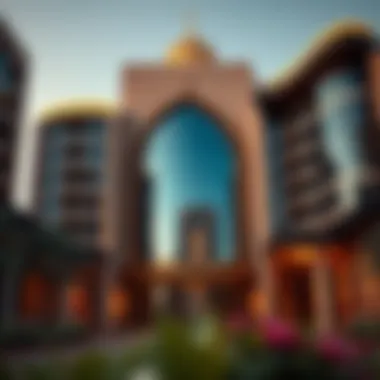Essential Guide to Ejari Renewal in Dubai


Intro
Navigating the labyrinth of real estate in Dubai can feel like a daunting task, especially if you are unfamiliar with the local laws and regulations governing property rentals and renewals. One of the pivotal elements in this domain is the Ejari system, designed to ensure transparency and legality between landlords and tenants. The renewal of an Ejari registration is not merely a bureaucratic formality; it plays a crucial role in safeguarding the rights of all parties involved. This article aims to break down the key requirements for Ejari renewal, clarify the documentation needed, and pinpoint procedural intricacies that are essential for property managers, tenants, and landlords alike.
By the end of this guide, readers will have a clear roadmap to navigate through the Ejari renewal process, empowering stakeholders to make informed decisions in Dubai's ever-evolving real estate market.
Market Trends and Insights
Understanding the current landscape of Dubai's real estate market profoundly affects how one approaches the Ejari renewal process. The implications of market trends stretch beyond mere statistics; they shape the very environment in which investment decisions are made.
Current Market Analysis
In 2023, the Dubai property market maintains a vibrant pulse. A recovery from previous economic challenges has fueled significant growth in various real estate sectors. The rise in foreign investments has been particularly notable, making the market attractive for both buyers and renters. Thus, maintaining an updated Ejari registration is more relevant than ever. With population growth and tourism on the rise, many are seeking properties for both temporary and long-term stays. This demand creates a necessity for proper documentation and legal clarity, bolstered significantly by the Ejari system.
Knowing current trends can aid tenants in negotiating leases while landlords can use data to set competitive rental prices.
Emerging Neighborhoods
Dubai is a city that never stands still; neighborhoods evolve quickly, and where once it might have been advantageous to reside in a well-established area, newer locales now offer fresh opportunities. Places such as Dubai Marina and Dubai South are gaining traction, while traditional hubs like Jumeirah continue to hold their value.
As certain areas gain popularity, understanding the evolving demographics can help renters find their ideal home while allowing landlords to decide where to invest. For those looking at the bigger picture, keeping abreast of these developments ensures that property managers can execute effective lease renewals in emerging neighborhoods.
Investment Strategies
As the market landscape changes, so too do the strategies surrounding investment. Whether you are looking to buy or rent, understanding the pros and cons can influence your overall experience.
Buying vs. Renting
When weighing options, one must consider their objectives and financial commitments. Buying a property in Dubai often represents a long-term investment that can appreciate over time, particularly in sought-after neighborhoods.
However, renting tends to offer flexibility and lower upfront costs, particularly useful for expatriates who might only be in Dubai for a limited time. In both scenarios, keeping an Ejari registration up to date is paramount to avoid legal pitfalls.
Long-term Investment Prospects
Investors are notably intrigued with Dubai's long-term investment prospects. The city’s ongoing infrastructure development and strategic geographical location present compelling reasons to consider property as a stable long-term investment.
A property’s renewal through Ejari affects its marketability; if a property is not compliant, its value may diminish. Therefore, understanding the implications of Ejari compliance at both the tenant and landlord levels is something no stakeholder can afford to overlook.
"Navigating the renewal process isn't just about legality; it's about understanding your role as an informed participant in Dubai’s dynamic real estate sphere."
Prelims to Ejari
Navigating the intricate waters of Dubai’s real estate market demands a firm grasp on various regulations, with Ejari standing out as a pivotal component. The primary function of Ejari is to formalize rental agreements, creating a transparent environment that benefits landlords, tenants, and agents alike. This arrangement is not just a bureaucratic formality—it’s crucial for legal protection and can heavily influence the property rental landscape.
Understanding the underlying principles of Ejari goes beyond regulatory compliance; it's about recognizing how this registration system safeguards the interests of everyone involved in the rental process. This introduction lays the groundwork for exploring Ejari in depth, peeling back the layers to reveal its significance, status, and utility in the bustling market of Dubai.
Definition and Purpose of Ejari
Ejari, literally translating to "my rent" in Arabic, serves as a government-mandated system established by the Real Estate Regulatory Agency (RERA) in Dubai. It functions as a digital platform for registering lease agreements between landlords and tenants. This registration is not merely optional; it is mandated by law, ensuring that both parties can reference a legally binding agreement.
The purpose of Ejari is manifold. Primarily, it ensures that all rental contracts are standardized and transparent, which not only enhances trust between parties but also aids in the resolution of disputes should they arise. Ejari registration is often a prerequisite for various services, including obtaining a Dubai Electricity and Water Authority (DEWA) connection, making it indispensable for tenants.
Overview of the Real Estate Market in Dubai
Dubai’s real estate market is a dynamic entity, marked by rapid growth and development. As the city continues to evolve as a global hub for business and tourism, the demand for housing—both rental and owned—has surged dramatically. The market is characterized by its diversity, showcasing a blend of luxury apartments, villas, and commercial spaces.
The real estate sector in Dubai is not only influenced by local economic conditions but also by international factors, where investors from around the world flock to the city looking for lucrative opportunities. With its often-evolving legal landscape, staying abreast of regulations such as Ejari is crucial for participants in the market.
In this environment, the standardization provided by Ejari aids in making informed decisions for investors, homebuyers, renters, and property managers. As the city pushes toward modernization, being knowledgeable about these regulations becomes a vital tool for navigating its fast-paced market, ensuring compliance, and ultimately securing peace of mind for all parties involved.
Legal Framework Surrounding Ejari
The series of regulations governing Ejari provides a backbone to the real estate ecosystem in Dubai. Understanding this legal framework is vital, as it establishes the ground rules for compliance, protecting the interests of landlords, tenants, and agents alike. With real estate being a major pillar of Dubai’s economy, this framework ensures that the operation of property management aligns with both local laws and international standards.
Regulatory Authorities Involved
In Dubai, several key agencies play an instrumental role in enforcing the Ejari system. The Real Estate Regulatory Agency (RERA), part of the Dubai Land Department, oversees the implementation of Ejari laws. They ensure the integrity of rental agreements and facilitate transparency in the real estate market. This agency is not just a regulatory body; it acts as a bridge between investors, landlords, and tenants, fostering trust within the industry.
Additionally, the Dubai Land Department keeps records of all registered contracts under the Ejari system. Their involvement ensures that any discrepancies can be addressed swiftly and fairly, maintaining the stability of the rental market. It's crucial for stakeholders, whether they are expats or locals, to understand that compliance with RERA and the Dubai Land Department is not merely a matter of formality; it’s about safeguarding one's investments.


"Understanding the regulatory landscape is half the battle won when navigating the complexities of Ejari."
Legislation Impacting Ejari Operations
The legislative environment surrounding Ejari encompasses several critical laws and regulations that all stakeholders must recognize. Law No. 26 of 2007 encapsulates the foundation of the rental market in Dubai, setting forth the rights and responsibilities of landlords and tenants. It outlines the measures for resolving disputes, thereby promoting fairness and equitable treatment.
Furthermore, legislation such as Law No. 33 of 2008 clarifies the penalties regarding non-compliance with Ejari requirements. This is particularly relevant to those who may overlook renewal deadlines or omit vital documents during registration. Understanding these nuances can save parties involved both time and money, as well as avoid legal entanglements.
To be compliant, all contracts must reflect the current market conditions and terms agreed upon by both parties. This is where properly updating Ejari registrations becomes vital to ensuring that all agreements remain binding and enforceable according to the law. Missing the mark could mean not only losing a dispute but also incurring financial losses.
Lastly, it's worth noting that with the rapid evolution of Dubai's real estate landscape, legislative frameworks can change. Staying abreast of such updates is imperative for anyone involved in property management or leasing. Regular consultations with these regulatory authorities or legal experts can help stakeholders maintain compliance and leverage opportunities presented by these laws.
Ejari Registration Process
The Ejari registration process is a cornerstone of the real estate landscape in Dubai. Without proper registration, transactions involving leases become precarious, almost like walking a tightrope without a safety net. Understanding how to navigate this process is vital for anyone involved in renting or managing properties in this vibrant city. A solid grasp of the registration process not only ensures legal compliance but also provides a sense of security for all parties involved.
Initial Registration Requirements
Before diving into the nitty-gritty, one must be aware of the initial registration requirements for Ejari. Generally speaking, the following documents and information are necessary:
- Tenancy Contract: The original contract that has been signed by both the landlord and the tenant.
- Emirates ID: This serves as proof of identity for both parties. It’s crucial to ensure that all IDs are valid and not near expiration.
- Property Title Deed: This document shows that the landlord is the rightful owner of the property. It must be an official document issued by the Dubai Land Department.
- Proof of Ownership: Alongside the title deed, any certifications showing that the landlord has the right to lease the property also help in smoothing the process.
- No-objection Certificate (NOC): In some cases, landlords may need to provide a NOC from their mortgage provider, confirming they’re allowed to lease the property.
Gathering these documents ahead of time acts like gathering the right tools before starting a repair; it makes the process more seamless.
Steps for Registration
The registration steps are fairly straightforward once all paperwork is in hand. Here’s a rundown of the process:
- Visit a registered Ejari Service Center or use the official website. You can start either online or in person, depending on what suits you best.
- Fill out the registration form. This form can often be found on the portals associated with RERA, or you could ask for assistance in person.
- Submit Required Documents. Hand over the tenancy contract, Emirates IDs, property title deed, proof of ownership, and any other required documents. Don’t forget to keep copies!
- Pay the Fees. Registration within the Ejari system usually incurs a fee. It’s best to have this ready to avoid any delayed processing.
- Receive Confirmation. After processing your application, you should receive a confirmation that your registration was successful. This is your golden ticket; keep it safely stored.
It's crucial to remember that accurate information during registration helps avoid headaches down the line. If something's amiss, it can lead to unnecessary legal challenges or renewal issues in the future.
By understanding the registration process thoroughly, individuals can confidently manage their real estate dealings, reducing the risks associated with non-compliance. And with Dubai’s ever-changing property market, having your Ejari in order is more important than ever.
Renewal of Ejari
The renewal of Ejari is a vital part of maintaining rental agreements in Dubai. This process ensures that the registration remains valid and up-to-date, which is crucial for various stakeholders in the property market, including landlords, tenants, and property managers. A valid Ejari protects rights, provides legal backing, and prevents potential disputes that may arise from lapsed registrations. It isn't just a box to check off; it's a key component of the rental landscape in this bustling city.
When to Renew Your Ejari
Knowing when to renew your Ejari can save you a heap of trouble down the road. Generally, if your rental contract is coming to its end or you've made changes to your existing agreement—maybe a new tenant or a shifted payment structure—it's high time to get your Ejari renewed. Ideally, you should start this process at least 30 days before the expiry date of your current Ejari certificate. This gives enough room to tackle any paperwork delays or issues that may arise.
If you're oblivious to the renewal timelines, you might find yourself in hot water. An expired Ejari can lead to complication during legal proceedings or when trying to engage with governmental services pertaining to the property. Hence, keeping a calendar reminder isn't such a bad idea—especially in a market like Dubai’s, which is always ticking and moving.
Requirements for Renewal
Renewing your Ejari isn't simply about filling out a form and calling it a day. There are several key requirements you must have in order before you can move forward. First, ensure your original tenancy contract is on hand, as it's the cornerstone of the renewal process.
You'll also require a couple of essential documents, which may include:
- A copy of your Emirates ID or passport
- Proof of the last paid rent, showing timely payments
- A no-objection certificate from the landlord, if applicable
These documents serve as evidence of your ongoing relationship with the property and ensure all parties are on the same page.
"Being prepared is the cornerstone of a smooth Ejari renewal process."
Proper preparation is your best ally in this scenario. Having all required documentation ready allows you to avoid any last-minute scrambles, which can be both frustrating and time-consuming. As you go through the renewal process, keep note of any additional requirements that might hinge on specific circumstances regarding your property. Knowing what to bring to the table can make the difference between a seamless renewal and a drawn-out hassle.
In summary, understanding when to renew and what the requirements are will significantly ease your journey through the Ejari renewal process. It's not just about ticking boxes; it's about upholding your rights and responsibilities within Dubai's fast-paced real estate landscape.
Required Documentation
When it comes to the process of renewing your Ejari registration in Dubai, having the right documentation is paramount. Just like having the right tools for a job can make all the difference, your paperwork serves as the bedrock for ensuring a smooth and accurate renewal experience. For property managers, tenants, and landlords alike, understanding what is needed can save time and prevent unforeseen complications.
Essential Documents for Renewal
To initiate the Ejari renewal process, several specific documents are essential. Missing even one of these can elicit delays in completing the contractual obligations. Here’s a rundown of what’s generally required:
- Existing Ejari Certificate: This document is foundational, as it contains the reference number needed for renewal.
- Tenancy Contract: Ensure this is the most current version, detailing the terms of the rental agreement.
- Property Ownership Documents: For landlords, having proof of property ownership such as a Title Deed can clear up any potential misunderstandings.
- Emirates ID Copies: Both the landlord and tenant need to provide photocopies of their Emirates IDs.
- Utilities Receipts: Recent bills may be requested to verify occupancy.


Having these documents ready will significantly streamline the renewal process and aid in fulfilling the legal requirements without hassle.
Valid Identification Requirements
When dealing with Ejari renewal, valid identification is not just a formality; it acts as a gatekeeper to ensure that the parties involved are legitimate. The main identification requirements print a clear line concerning who can renew the contract. The must-haves include:
- Emirates ID: This is the most critical document. Both tenants and landlords must present valid Emirates IDs as proof of identity. Make sure that the IDs are up-to-date; expired IDs will raise red flags.
- Passport Copies: In some cases, especially for expatriates, having a copy of the passport could play a role in verification. Though the Emirates ID does the heavy lifting, this can often serve as supplementary evidence.
In summary, ensuring that you have the right identification documents simplifies the renewal process and helps avoid potential rejections. Take note of the specific requirements stipulated by the Real Estate Regulatory Agency (RERA) for a hassle-free experience.
Tip: Always double-check the specifics on the RERA official government website. This will ensure you're fully in the loop on any potential changes to the required documentation.
Fees Associated with Ejari Renewal
When it comes to renewing your Ejari, understanding the associated fees can save you not just a couple of dirhams but also a heap of potential hassle down the road. In Dubai's real estate sphere, where each penny matters whether you're a landlord or a tenant, knowing the costs involved is paramount. This understanding can help in budgeting and planning your finances effectively, avoiding any unwelcome surprises when the renewal time rolls around.
Overview of Fees
The fees for renewing an Ejari can vary based on several factors, including property type and location. Generally, the Ejari renewal fee is relatively modest, but it’s essential to stay abreast of any changes in the cost structure. Here’s a quick rundown:
- Typical Range: The renewal fees often hover around a few hundred dirhams.
- Possible Additional Fees: In some circumstances, administrative fees may apply, depending on the service provider or the specific requirements tied to your property.
- Discount Programs: Sometimes, certain government initiatives or promotions may provide discounts, often aimed at encouraging timely renewals.
- Market Influences: Given that Dubai’s real estate market is dynamic, keeping an eye on trends can provide insights into potential fluctuations in fees.
Understanding these costs can empower you in negotiations with landlords or clients as well.
Modes of Payment Accepted
Selecting the right mode of payment for your Ejari renewal can significantly ease the process. Here are the common payment methods you will encounter:
- Online Payment: The easiest route would often be via online payment through the government portal. It's a straight-forward process where you can pay via credit or debit card.
- Bank Transfers: Some may prefer direct bank transfers, but it's crucial to ensure you're transferring to a legitimate account to avoid any mix-ups.
- Cash Payments: If you're more comfortable with handling cash, certain offices will accept cash payments, but be sure to retain your receipt.
- Mobile Wallets: Increasingly, mobile payment options like Apple Pay or Samsung Pay are being accepted, making it convenient for tech-savvy individuals.
As you navigate the payment landscape, keeping a record of your transactions is beneficial should any discrepancies arise later. In Dubai, it’s always wise to keep your financial documentation in order.
Online Ejari Services
In today’s fast-paced environment, Online Ejari Services are becoming quite vital for anyone involved in the Dubai real estate scene. This digital approach streamlines processes, making it easier for tenants, property managers, and landlords alike to manage their renewals efficiently. Not only does it save time, but it also simplifies documentation requirements that might otherwise bog down the process.
Using online platforms, stakeholders can access their Ejari registration without stepping foot outside. The convenience of filling forms, uploading documents, and tracking application status from anywhere in the world can significantly improve the experience. Plus, it reduces the likelihood of errors that can arise from physically handling paperwork.
Utilizing Government Portals
The Dubai government has made strides in making the Ejari renewal process very accessible through its official portals. Websites like DubaiLand.gov.ae offer robust guidance on following the right steps. In addition, they provide resources such as FAQs and help sections that can be quite resourceful in tackling common questions.
To use these portals effectively, individuals should register for an online account, ensuring they have all necessary identification and property related documents on hand. Remember, familiarity with the interface can save precious time, so exploring these platforms beforehand can pay off!
Steps for Online Renewal of Ejari
Renewing your Ejari online is a straight-forward task, provided you follow these simple steps:
- Log into the Government Portal
- Navigate to the Ejari Section
- Fill in Required Forms
- Upload Necessary Documents
- Review and Submit
- Track Your Application
- Begin by visiting the official portal and logging in.
- If you're a new user, you'll need to create an account, which may require personal details and verification steps.
- After logging in, look for the Ejari section which will guide you to renewal options.
- Here, you’ll need to provide details about the property, tenant, and any information that is needed for the application. Ensure accuracy to avoid complications.
- Once the form is filled, proceed to upload the required documents, as outlined in the earlier sections. This might include identification, ownership proofs, or any tenancy agreements.
- Before hitting that submit button, double-check all entries for accuracy. A little diligence can save you from headaches later.
- After submission, keep an eye on the status of your renewal. Most portals will provide an option to track your application’s progress.
By engaging in the online Ejari services, you’re not just saving yourself a trip to the office; you’re also ensuring a smoother transaction. With a little familiarity and the right approach, this method of renewal can make a significant difference in managing your real estate matters in Dubai.
Common Challenges in Renewal
Renewing your Ejari can sometimes feel like trying to navigate a maze without a map. While the process itself is designed to be straightforward, many individuals run into bumps along the way. Understanding common challenges can save you time and reduce frustration when renewing your Ejari. In this section, we'll highlight some frequent hurdles that property managers, tenants, and landlords often face. Additionally, we’ll discuss the importance of overcoming these obstacles to ensure a seamless experience during renewal.
Frequent Issues Faced


When diving into the practicalities of Ejari renewal, a handful of recurring issues tend to pop up time and again. Some notable concerns include:
- Inadequate Documentation: Failing to have the right paperwork on hand is a common stumbling block. Without essential documents like your Emirates ID or the previous Ejari certificate, the renewal cannot proceed.
- Understanding Fees: Often, individuals underestimate or miscalculate the associated fees. Being aware of changes in costs—or miscellaneous charges—before initiating the renewal can save a lot of headache.
- Online System Glitches: Technical issues may arise on the government portal, leading to complications when filling out forms or making payments. Frustrated users may feel stuck if they don’t have backup options.
- Expiry of Current Ejari: Letting the Ejari reach expiry can complicate the renewal process. Most landlords intuitively know that letting things lapse can result in delays and potential additional fees.
- Communication Barriers: Sometimes, misunderstanding instructions or lack of clarity from real estate agents or property managers leads to further complications. Effective communication is vital here.
Troubleshooting Solutions
By being proactive and aware of these common issues, you can arm yourself with solutions that may help you breeze through the renewal process. Consider the following troubleshooting methods:
- Prepare Documentation in Advance: Check the complete list of required documents well ahead of the renewal date. Ensure all papers are valid and available for submission.
- Budget for Additional Fees: Familiarize yourself with the fees by checking Dubai Land Department's website for the most current rates. Keeping some extra funds can help you address unexpected costs without stress.
- Utilize Troubleshooting Tools for Online Issues: In case the online platform throws a tantrum, it's wise to have local contact numbers handy for quick support, or check forums like Reddit for advice from fellow users who may have solved similar hassles.
- Track Expiry Dates Rigorously: Set reminders for your renewal dates in personal calendars or use apps. This way, you can renew before your current Ejari expires, helping you avoid penalties.
- Enhance Communication: If something is unclear, do not hesitate to reach out for clarification. Don’t shy away from asking questions to your property manager or directly contacting the relevant authorities.
By staying ahead of these common challenges, you can turn what may seem like an arduous task into a relatively straightforward process. Remember, knowledge is your best ally when it comes to navigating renewal crises.
Impact of Non-Renewal
When looking at the landscape of Dubai’s property rental scenario, it's helpful to recognize the ramifications that arise from not renewing an Ejari registration. It's not just a matter of paperwork; the consequences could ripple through every transaction, affecting tenants, landlords, and property managers alike.
Consequences of Expired Ejari
First and foremost, if an Ejari becomes outdated, the immediate consequence is that the lease agreement may no longer hold legal weight. This can lead to substantial confusion for both tenants and landlords. For tenants, they might find themselves in a precarious position where their rights become questionable. If issues arise—like disputes over rental payments or eviction notices—the expired Ejari could become a legal loophole that landlords exploit. The following points highlight the crucial consequences of not renewing:
- Lack of Legal Protection: Without a valid Ejari, tenants could face risks, such as unfair eviction practices, since the lease is not backed by legal documentation.
- Complicated Disputes: Should any disagreements occur concerning the property, having an expired Ejari complicates dispute resolution. It undermines the authority of agreements.
- Potential Fines: The Dubai Land Department might impose fines for operating with an expired Ejari, affecting both landlords and property managers financially.
Ultimately, neglecting to renew your Ejari can send landlords and tenants back to square one, creating scenarios that are difficult to escape from.
Legal Ramifications
From a legal standpoint, the implications of non-renewal can be quite severe, especially when considering Dubai's well-structured regulations that govern property rentals.
- Void Agreements: As soon as the registration lapses, the lease can be considered void, impacting tenants' rights to stay in the property.
- Legal Action by Landlords: Landlords may initiate legal proceedings against tenants for occupying the premises without an enforceable agreement. This situation can escalate into a legal nightmare.
- Impacts on Property Managers: Property management firms could also face legal scrutiny if they fail to ensure that all properties in their portfolio have up-to-date Ejari registrations. The reductive scenario can lead to loss of reputation.
"In the world of real estate, neglecting documentation can lead to a chain reaction of complications that are difficult to manage."
As evident, the stakes for failing to renew an Ejari registration extend beyond simple documentation. It is vital for everyone's involvement in the lease process to understand these repercussions to avoid potential legal troubles and financial consequences. It’s not just about compliance; it’s about safeguarding one’s rights in the dynamic real estate market of Dubai.
Best Practices for Ejari Management
Effective management of Ejari registrations is crucial for maintaining a smooth operation within Dubai's bustling real estate market. Given the dynamic nature of property transactions and tenant relations in this city, following best practices ensures compliance with regulations and minimizes potential issues. Property managers, landlords, and tenants alike can benefit from embracing these practices, which focus on preventing oversight and maintaining the integrity of lease agreements.
Maintaining Up-to-Date Records
Staying organized is half the battle when it comes to managing Ejari registrations. It cannot be emphasized enough how important it is to keep your records current. This entails regularly updating information to reflect any changes in tenancy or property management.
When documents like tenancy agreements or occupancy certificates become outdated or are not updated in the Ejari system, it can lead to complications down the line. These include difficulty in issuing renewal notifications, delays in legal processes, or even penalties for non-compliance. Here are a few pointers to help in maintaining meticulous records:
- Regular Review: Set a schedule, perhaps quarterly, to review all records associated with Ejari. This helps to catch discrepancies early.
- Digital Storage: Utilize cloud storage for easy access and sharing among stakeholders. It also offers a backup solution in case of physical damage or loss.
- Documentation: Ensure all documentation regarding previous registrations, correspondence, and tenant profiles are neatly organized and easily accessible.
Adhering to these practices not only secures compliance but also builds trust with tenants and landlords. The more organized you are, the smoother your operations will run.
Regular Monitoring of Renewal Dates
Timing is everything, especially when it comes to Ejari renewals. One of the simplest yet most often overlooked practices is keeping an eye on renewal dates. When those files start to pile up, it’s easy to miss an important deadline, but the consequences can be severe.
Renewal dates are critical. If an Ejari registration lapses, it can create a whirlwind of issues, from financial penalties to legal troubles. Therefore, regular monitoring is a non-negotiable aspect of effective Ejari management. Here are some tips to stay ahead of the game:
- Create Alerts: Utilize digital calendars to set reminders a few weeks before the renewal date. It’s always better to be a few steps ahead.
- Engage Stakeholders: Make it a point to communicate renewal timelines with all parties involved, including landlords, tenants, and property agents. A team-oriented approach helps reinforce accountability.
- Document in Advance: Prepare necessary documents ahead of time for the renewal process. This can include previous Ejari documentation and updated tenant information, ensuring a quick transition when it’s renewal time.
"A stitch in time saves nine." Keeping tabs on renewal dates can help avoid many headaches later on.
By advocating for maintaining records and keeping an eye on renewal dates, stakeholders can navigate the Ejari landscape more efficiently, avoiding pitfalls and ensuring smooth operations in a competitive market.
End and Future Outlook
In wrapping up the discussion on Ejari renewal requirements, it's vital to revisit why this topic holds significant weight in Dubai's real estate landscape. The Ejari system, in essence, serves as a formal recognition of tenancy agreements, essentially acting as the backbone of rental transactions in the emirate. As such, keeping your Ejari registration up-to-date is not merely a bureaucratic formality; it’s crucial for both legal compliance and the protection of tenant and landlord rights.
Summary of Key Takeaways
To crystallize the pertinent aspects of Ejari renewal:
- Timely Renewals: Staying ahead of renewal deadlines prevents unnecessary legal complications. Understanding the timeline for renewals can save both tenants and landlords from headaches down the line.
- Documentation Preparedness: Gathering necessary documents prior to initiating the renewal process is critical. Familiarize yourself with the required paperwork so that everything is in order when the time comes for renewal.
- Online Services: Utilizing online portals can streamline the renewal process. Familiarity with these digital tools is essential as more people seek to navigate administrative tasks online.
- Legal Implications of Non-Renewal: The consequences of failing to renew an Ejari registration can be severe, ranging from fines to potential disputes over tenancy rights.
- Engagement with Regulatory Authorities: Keep an open line of communication with relevant governmental bodies. Authorities like the Dubai Land Department are a resource for clarifying any uncertainties regarding renewals.
Future Trends in Ejari Registration
Looking ahead, we can foresee several trends that might influence how Ejari registrations and renewals are managed:
- Increased Digitalization: The UAE's push towards digital transformation will likely result in more streamlined online services for Ejari updates and renewals. Expect to see advancements in user interfaces and enhanced accessibility for new services.
- Greater Regulatory Oversight: As the rental market in Dubai continues to evolve, an uptick in regulatory measures may arise. This could include more stringent compliance checks and updated guidelines that landlords and tenants need to be aware of.
- Focus on Transparency: With the rise of smart technologies, there’s a chance for improved transparency in the rental process. Smart contracts and other technologies may streamline overall transactions and enhance trust between parties involved in rental agreements.
- Evolving Market Demands: As the real estate market shifts, adaptability in your understanding of the Ejari system will be key. Keep an ear to the ground for emerging trends that may dictate changes in how leases and rentals are viewed within the market context.
In essence, while the fundamentals of Ejari renewal remain consistent, keeping abreast of the evolving real estate landscape will empower stakeholders to navigate with confidence. Don't underestimate the value of staying informed. With the right knowledge, one can make smart decisions that benefit all parties involved.







